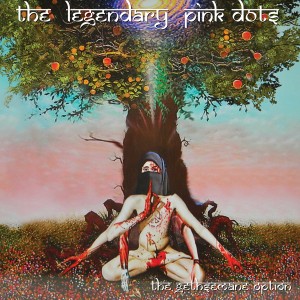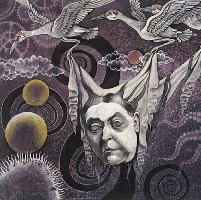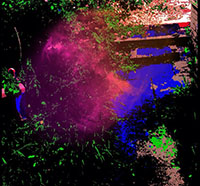In the unlikely event of the complete history of home recording ever being written, the Legendary Pink Dots should occupy a large chunk of the Eighties section. Still active after numerous line-up changes and disastrous label wranglings, their music has ranged from the tinny Bontempi-and-anguish songs of the early years to the more recent combination of Dub, Kosmische and Barret-esque electroacoustic songs and meta-Space Rock topped off by the emotional, poetic delivery of singer Edward Ka-Spel. Their combination of psychedelic sounds and apocalyptic SF imagery and fantasy (more Ballard or Ellison than Star Wars or Tolkien) have led to some irrelevant comparisons to Pink Floyd, but a closer relationship exists with contemporaries Current 93, Coil or Nurse With Wound. In common with those groups however, as ANTRON S. MEISTER reveals in this biography thinly disguised as a round-up of diverse recent releases, the Dots sound is wholly unique.
Under Triple Moons
(ROIR)
Stained Glass Soma Fountains
(Soleilmoon/Staalplaat)
Hallway Of The Gods
(Terminal Kaleidoscope/Soleilmoon)
Chemical Playschool 10
(Soleilmoon/Staalplaat)
Driven by a burning need to produce music against the odds of urban squat life under Thatcher, and with almost no money for studio time, the Dots were part of the early 80s’ experimental cassette underground. They have spent much of the last couple of years transferring their contributions to that vibrant post-Punk scene to CD, and there’s also been time for the production of a new full-length album. As if that wasn’t enough, a collection of otherwise placeless pieces surfaced as the latest in the Chemical Playschool series, alongside yet another collaboration with Vancouver’s Skinny Puppy/Download crew in the Tear Graden project. The two core members, Ka-Spel and Phil Knight (aka the Silverman) have also released substantial solo works over the years, with Ka-Spel’s output the most prolific at around ten albums and numerous singles to date.
The Dots have stuck it out for seventeen years in relative obscurity, certainly in their home country, and have become a European (now trans-Atlantic) band with a home and studio in Nijmegen from which they make forays across the continent, though rarely touching British venues. However, Ka-Spel’s views on his homeland are shifting in the light of the changes in British society during his twelve years of semi-exile. “I’m very fond of the old country these days and actually hope that it doesn’t take on the many irritating habits of its European sisters” he reflects. “Holland is a bureaucratic hell of state control to an advanced degree. Even so, I was a damn sight more impressed by old Labour and the likes of Ken Livingstone who actually bought a smile to the sour face of politics. New Labour simply seems like a slight lesser of evils.” Edward’s personal vision for Europe is both typically Utopian and engagingly unreal. “Still I have fantasies about redistributing all the wealth, throwing down all the borders and piping psychedelic and classical music through tannoys in the high streets with placards of rabbits beaming down at the populace from all angles.”
The almost total lack of interest in the UK (or at least the music press here) is not shared in places as diverse as Poland, France and the USA. In the latter, recent tours have lasted over a month, touching each coast and all points in between, the word spread increasingly by their Internet mailing list, Cloud Zero. Strangely, their biggest concert to date was in Mexico City in front of an audience of 2,500 at the end of 1995. The Dots have never given a damn about the production of marketable, safe music – despite the best efforts of their former label, Play It Again Sam. Ka-Spel’s memories of a decade with PIAS are not entirely happy. “It always has seemed like a roller-coaster ride,” he says. “We had a small taste of success first in 1987 when Any Day Now did rather well, but it wasn’t until 1991 when things really took off a little with The Maria Dimension. Alas it seemed we sank back into obscurity almost immediately as PIAS hated Shadow Weaver and neglected it (and all albums afterwards), finally causing us to run for the hills – though not before they’d got us to sign away that back catalogue as a 5 year licence ’til the year 2000. Things are building up again now… Even so, mistakes are part of life and you should learn from them. I hope I have.”
Though the remastering work is by no means complete, two collections bringing together the best of the cassette material surfaced in 1997. Soleilmoon’s double CD set Stained Glass Soma Fountains catalogues the group’s earliest surviving recordings from 1980 (when they were called, somehwat less memorably, As One) to pieces from the mid-80s. Under Triple Moons (ROIR) is of similar vintage, and is essentially a companion release. Both contain instalments of the long-running ‘Premonitions’ series of tape-collage pieces, constucted from a combination of environmental sounds, backwards voices and thoughtful guitar and keyboard lines. As with many early 80s post-Industrialists, the ‘Premonitions’ display a boom-and-bust fatigue which led to the self-exile of Ka-Spel and The Silverman to Holland (appropriately enough) in 1984, and rank as the Dots’ most intriguing moments of disconcerting sonic manipulation.
The original recording quality varies from the clear to the murky, though the music itself shines through. The flanged guitars, rickety drum machines and the ever-favourite occasional vocoding of Ka-Spel’s vocals are at their best on the Space Invaders ditty ‘Dying For The Emperor’ and the surprisingly jaunty ‘Frosty’, which shows both the optimistic and twisted aspects of his lyrical concerns, as the subject finds sanctuary in a fridge as Europe fries in all-out nuclear war. Typical of the Dots’ approach of using musical quotations to jarring and disorienting effect, ‘Jungle 2’ suddenly breaks into ‘Ring A Roses’, while ‘Lust For Powder (Version Apocalypse)’ mashes up a live favourite, warping in fragments of Carl Orff and sound effects in a manner reminiscent of Adrian Sherwood’s more unsettling dubs of Mark Stewart.
The Dots have never given a damn about the production of marketable, safe music (despite the best efforts of their former label), and Under Triple Moons and SGSF skim the surface of a vast back-catalogue lurking in the Legendary Pink archives which may see the digital light of day soon. Despite some appaling packaging on both releases (Under Triple Moons bravely includes a group photo to rival those of Throbbing Gristle or Chris & Cosey in its capacity for embarrassing both their children and more recent fans), both show the development of the London line-up of the group as they experimented and innovated their way through a (self-)isolated sub-culture. Even now, the band’s independent releases continue through the production of bespoke CD-Rs (and cassettes for non-digital fans) of live and ancient material via mail order on their resurrected Terminal Kaleidoscope label. This is a technological advance which, along with the rise in home hard-disk recording and the imminent official homepages, has exponentially developed the DIY culture of some fifteen years ago into a way for those committed enough to bypass the wiles of the music industry.
Some ten years on, and apparently influenced by Flying Saucer Attack and Tortoise as well as the introspective re-appraisal of their own past brought on by the re-releases, the Dots’ latest studio album is Hallway Of The Gods . Described as ‘Sensurround in Eight Dimensions’, there’s the usual combination of Tarot and SF imagery, failed romance and an apocalyptic, existential concern with the repetitive cycles of history. The production levels are overly clean (and perhaps new guitarist Atwyn could have been asked to cut the solos down to more consistent size), but the work as a whole still retains the Dots inimitable capacity to surprise with their highly-developed ear for the subtle use of sampler, hard-disk and voice, albeit to a lesser degree than before.
The slow-burning epic ‘The Saucers Are Coming,’ an update of Well(e)s’ The War Of The Worlds (which nods more to Orson than HG), is a quaintly Fifties-style UFO invasion story set to a throbbing backbeat and analogue synths to rival Hawkwind’s. This is the centrepiece of an album which, on the opening ‘On High’, takes just enough from Drum ‘n’ Bass to show they’ve noticed, but not enough to compromise the consistency of the view down the Terminal Kaleidoscope, the Dots’ metaphorical device which points relentlessly towards an unknowable future. Ka-Spel’s view on the current upsurge of Electronica takes a long-term view. “I never really cared much for movements, they create a tendency for a lot of different artists and bands to be indistinguishable from one another,” he observes. “There again, some interesting music has come out of the Drum ‘n’ Bass stable and indeed the Triphop stable. However, give it 10 years, and probably people will only refer back to Tricky, a couple of Aphex Twin pieces and U2 or Bowie’s experiments with Drum And Bass.”
The final album of 1997’s hectic release schedule, Chemical Playschool 10 , shows that even the off-cuts of the Dots are prime. Fragments of jams, doodles and sketches provide an insight into the obsessive recordings of this workaholic group, the CD packaging selected from the artwork of their equally dedicated fans. Like the tape collections, the pieces here are free to work outside the confines of the album format, and frequent moments of bizarre genius occur on what may actually be the most interesting of the recent releases. Ka-Spel describes the pair as “definitely both pre-millenium works; they begin a new phase of the accelerating soundtrack. Part Three is already recorded, a very intense album – quite an extreme beast!” As for their plans for the Millenium itself, there will be “Five albums in the last five days of 1999, to be consequent in creating the soundtrack for the Terminal Kaleidoscope.”
Quite whether this deluge of material will win the Dots new converts is an issue open to question. With their fans as obsessive as Fall enthusiasts, there’ll doubtless be takers for every recording they care to put out, though they don’t really need or desire the adulation of the MTV-fed masses. There’s the new CD awaiting release, plus the solo Blue Room album from Edward, with others by the Silverman and Ryan Moore’s Twilight Circus dub project upcoming for 1998. At last, there’s a sense that the Pink Dots may be finding the contemporary era of astonishing cross-cultural eclecticism (musically or otherwise) more accepting of their unique talents. “I couldn’t really do anything else now. All members have lived from the music we make for many years now,” reflects Ka-Spel. “What’s more , there’s still so much we haven’t tried – so many new places for the music to go.” The Millenium (no matter how artificial the concept), with its associated perils of future-shock and global change is only two years away, and the Dots will have marked its inevitable approach for two decades in appropriate style. Reflecting on the world’s headlong rush into the future with a mixture of fascination and dread, Ka-Spel coined a motto for the Legendary Pink Dots at their inception which expresses perfectly the group’s raison d’etre (and may well explain the size of their discography) – sing while you may!
-Antron S. Meister 1997
(Exact publication date unknown)



 Thirty-three years in existence, working in and around the peripheries of electronics and psych experimentation it is truly remarkable how a band could make a record as utterly enthralling as this when you realise this is around their fortieth album (there are most probably more). The Legendary Pink Dots still consist of voice-extraordinaire Edward Ka-Spel and Phil Knight – both of whom create under numerous aliases as well – with the addition of Erik Drost on guitar and bass (boy does he tremble the room at one point) and Raymond Steeg’s engineering complexities.
Thirty-three years in existence, working in and around the peripheries of electronics and psych experimentation it is truly remarkable how a band could make a record as utterly enthralling as this when you realise this is around their fortieth album (there are most probably more). The Legendary Pink Dots still consist of voice-extraordinaire Edward Ka-Spel and Phil Knight – both of whom create under numerous aliases as well – with the addition of Erik Drost on guitar and bass (boy does he tremble the room at one point) and Raymond Steeg’s engineering complexities.
 The Legendary Pink Dots’ discography is so expansive that it’s difficult to say something about their music with full authority. The Dots’ founding members—Edward Ka-Spel and Phil Knight—may not even know for themselves how many albums they have released by this point, although it’s safe to say the number of studio records exceeds 40. In 2014 alone, the band released one LP—10 to the Power of 9—two live albums and two compilations. One of those compilations, 12 Steps Off the Path, appeared in my inbox to review. Although there’s no knowing why 12 Steps Off the Path arose as the victor among the Legendary Pink Dots’ 2014 output, it does highlight the things that can be said about the band’s music—namely, it’s dark and filled with esoteric mystique, it’s loud, it’s psychedelic, it’s synthy, it’s gothy, and it’s still more thrilling today than many of the most hotly praised albums of the year.
The Legendary Pink Dots’ discography is so expansive that it’s difficult to say something about their music with full authority. The Dots’ founding members—Edward Ka-Spel and Phil Knight—may not even know for themselves how many albums they have released by this point, although it’s safe to say the number of studio records exceeds 40. In 2014 alone, the band released one LP—10 to the Power of 9—two live albums and two compilations. One of those compilations, 12 Steps Off the Path, appeared in my inbox to review. Although there’s no knowing why 12 Steps Off the Path arose as the victor among the Legendary Pink Dots’ 2014 output, it does highlight the things that can be said about the band’s music—namely, it’s dark and filled with esoteric mystique, it’s loud, it’s psychedelic, it’s synthy, it’s gothy, and it’s still more thrilling today than many of the most hotly praised albums of the year.